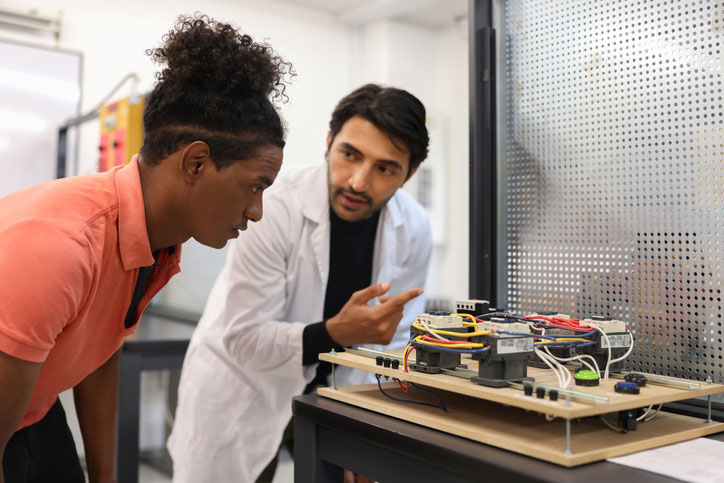Engineering Success: Breathing New Life into STEM Education in Rural Alabama
6/27/2023

STEM education is more important now than it has ever been. Rapid advancements in AI are already forcing vast swaths of workers to reskill and retrain. And with data becoming the hottest commodity of the 21st century, employers in virtually every industry need people with solid backgrounds in statistics, programming, and information analysis. In response, schools at every level are restructuring their curriculums to meet this demand.
However, not every school district has the resources to do so. In these largely rural and impoverished areas, even the youngest students are already being left behind.
This is perhaps no more evident than in the Black Belt region of Alabama. According to the Bureau of Economic Analysis, many of the about 20 counties that make up this stretch of rich, dark land are amongst the poorest in the state and the nation. The area's K-12 public education system reflects its dismal socio-economic situation:
- State assessments say only 22% of Black Belt students are proficient in science.
- In 2019, 39% of Black Belt residents had no more than a high school education. Only 6% had obtained any sort of professional or graduate certification.
- According to the Alabama Commission on the Evaluation of Services (ACES), 4 out of the 10 Alabama counties with the highest teacher turnover rates are in the Black Belt. In some districts, the rate is as high as 32%.
For 11 years, Dr. Chet Nicklas worked in secondary STEM education in Meridian, Mississippi, a city adjacent to the Black Belt. He saw many of the region's challenges firsthand:
Some of these areas have large amounts of land with not very many people. A lot of educators teach elementary all the way through middle school - maybe 3rd, 4th, 5th, and 6th grade all in the same day. So most of the time, nobody's going to transfer in to teach in our schools. The teachers are home-grown talent. They don't come from outside."
This harsh reality led Dr. Nicklas to change careers. But he didn't flee education or the Black Belt. In fact, he took a position that put him at the very center of the region's fight to improve STEM education. In October 2022, he became the Director of the Black Belt STEM Institute at the University of West Alabama.
The Institute is located on UWA's campus in Livingston, Alabama, on the western side of the Black Belt. It aims to train teachers in STEM education, ensure students are excited about STEM, and meet the region's demand for skilled STEM workers. But given the Black Belt's current issues, none of these are easy goals. In an interview with Teacher.org, Dr. Nicklas discussed these issues in detail and how he and his colleagues at the Institute are addressing them.
 After earning his bachelor's in biology and master's in Secondary Education, Dr. Chet Nicklas kicked off his career by spending 11 years teaching classes like AP Biology and genetics at high schools in Meridian, Mississippi. Not one to leave his passion for education in the classroom, he also served as a football coach and bus driver. In 2021, he earned his Doctor of Education in Rural Education and Organizational Change and Leadership from the University of West Alabama. His aptitude for science and talent for community engagement brought him back to UWA in 2022 where he now serves as the Black Belt STEM Institute's Director and as an Adjunct Professor.
After earning his bachelor's in biology and master's in Secondary Education, Dr. Chet Nicklas kicked off his career by spending 11 years teaching classes like AP Biology and genetics at high schools in Meridian, Mississippi. Not one to leave his passion for education in the classroom, he also served as a football coach and bus driver. In 2021, he earned his Doctor of Education in Rural Education and Organizational Change and Leadership from the University of West Alabama. His aptitude for science and talent for community engagement brought him back to UWA in 2022 where he now serves as the Black Belt STEM Institute's Director and as an Adjunct Professor.The Black Belt's Multilayered Teacher Problem
High teacher turnover rates and the stresses Dr. Nicklas saw in his career are only the beginning of the Black Belt's educational problems.
According to the ACES, Alabama increased its teaching workforce by 2,000 from 2015 to 2021. But this statistic isn't as hopeful as it seems. Over half of the teachers hired in that period had non-traditional or emergency teaching certificates.
Non-traditionally certified teachers are typically people who have changed careers and don't have a degree in education. State boards often grant more of these certificates to alleviate teacher shortages. Non-traditional teachers can certainly be great, but in an already stressed school district, they often lack the training, experience, and support to fill STEM education gaps. Due in part to this stress, Alabama only retains about 50% of these types of educators.
Fortunately, Dr. Nicklas says the Black Belt Institute is already addressing this issue for traditional and non-traditional teachers alike:
"We're hiring math and science STEM coaches to help teachers build efficacy. We hope to facilitate the likelihood that they're going to remain in the classroom and remain effective. Those sessions are going to be in-person and virtual. And that also comes with virtual mentoring sessions."
In these sessions, Black Belt Institute partners help teachers craft lesson plans, learn new STEM teaching methods, and come up with ways to reach their students. The Black Belt Institute also offers classes on specific areas of STEM. After completing a course, teachers receive a credential that demonstrates their mastery of the subject.

But where do the Black Belt Institute's coaches, mentors, and STEM experts come from? If Black Belt school districts are already so strained, who has the time to aid in professional development? Surprisingly, Dr. Nicklas says they largely come from the area:
"We use a collective impact approach - partnerships - to reach these schools. Everybody that can help here has had experience with the Black Belt region."
UWA's own faculty, students, and pre-service teachers from the school's College of Education partner with K-12 schools to address their specific needs. For instance, UWA's Cahaba Biodiversity Center recently joined forces with the Institute. Dr. Nicklas is planning on using their help to host biology-focused teacher retreats.
Other experts are drawn from local businesses and community-based organizations. This helps teachers and Black Belt Institute faculty deliver material that's up-to-date with industry demands. But despite their different backgrounds, everyone at the Institute has one important thing in common: they're invested in the Black Belt and want to see it succeed.
State Funding and Stipends: Making the Black Belt Institute Accessible for All
Geographically speaking, the Black Belt STEM Institute is readily accessible to most of the teachers it intends to serve. However, as experienced grant proposal writers, Dr. Nicklas and his UWA colleagues work hard to make sure it's economically accessible, as well:
"Because Alabama is in the bottom three states in math and science, we were able to get funding for this from the state. A lot of the educational consultants we use are state-funded already."
While faculty use their talents to fund the Institute itself, they also use them to directly benefit teachers:
"One of the things we've started to do is provide teacher stipends. So when we're starting programs, we offer teachers stipends to come to the training and also to be the leaders in their school to get programs rolling."
Fostering Passion for STEM Amongst Students
For even the most experienced educators, instilling a love for STEM in students can be an uphill battle. Field trips, hands-on projects, and science competitions are great tools, but Black Belt schools don't always have resources for them. Fortunately, the Black Belt STEM Institute does:
"We've purchased some equipment including robots, Microbits, and all the stuff schools need to get STEM off the ground. Then there's our partnership with Beta Box which does Skills on Wheels. They go around to different high schools and middle schools and do hands-on activities like programming cars and working with drones. They usually stay for about a week and then they leave teachers with all of these resources. It's really cool."
The Institute also partners with Hammer Math, an organization that teaches fractions, scaling, and measuring through hands-on construction projects. Dr. Nicklas says Black Belt students often get to experience HammerBuilds where students construct houses big enough for the whole group of 20-25 students to fit in.

But aside from hammering home fundamentals and stirring up excitement, Dr. Nicklas says these experiences can also prepare students to enter STEM careers:
"We invite companies to tell students what they're looking for. Some even do interviews and all that kind of stuff. That lets students know that if you can measure, you can get a job. Next week, NASA's coming. We're going on a little trip through the counties to present stuff they're offering career-wise. "
In a region where annual household incomes typically fall below $40,000 and unemployment rates sometimes reach a staggering 6.9%, these interactions are vital. They tell students that their potential isn't limited. They have a future and so does their community.
The Cornerstone of It All: Building Community Bonds
Even though the Black Belt STEM Institute is a UWA initiative, its faculty and partners have transformed it into something greater. They've created a place that strengthens bonds, a place where community stakeholders of all kinds can pool their resources, put their heads together, and work towards a common goal. This principle is at the core of everything Dr. Nicklas and his colleagues do:
"What we try to do first of all is create relationships. Relationships go a long way in making a difference. It's really hard to do it all by yourself."
While the Institute is addressing the Alabama Black Belt's unique educational issues, they're also creating a blueprint communities across the nation can follow. Each place will have to add its own flourishes to the plan, but as Dr. Nicklas demonstrates, students and teachers in even the most troubled districts can succeed when everyone makes education their top priority.










